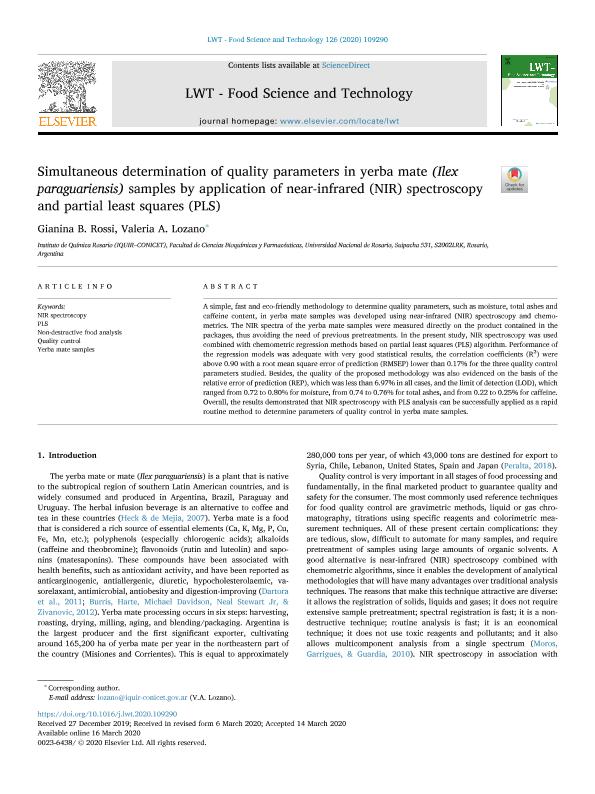Artículo
Simultaneous determination of quality parameters in yerba mate (Ilex paraguariensis) samples by application of near-infrared (NIR) spectroscopy and partial least squares (PLS)
Fecha de publicación:
05/2020
Editorial:
Elsevier Science
Revista:
LWT - Food Science and Technology
ISSN:
0023-6438
Idioma:
Inglés
Tipo de recurso:
Artículo publicado
Clasificación temática:
Resumen
A simple, fast and eco-friendly methodology to determine quality parameters, such as moisture, total ashes and caffeine content, in yerba mate samples was developed using near-infrared (NIR) spectroscopy and chemometrics. The NIR spectra of the yerba mate samples were measured directly on the product contained in the packages, thus avoiding the need of previous pretreatments. In the present study, NIR spectroscopy was used combined with chemometric regression methods based on partial least squares (PLS) algorithm. Performance of the regression models was adequate with very good statistical results, the correlation coefficients (R2) were above 0.90 with a root mean square error of prediction (RMSEP) lower than 0.17% for the three quality control parameters studied. Besides, the quality of the proposed methodology was also evidenced on the basis of the relative error of prediction (REP), which was less than 6.97% in all cases, and the limit of detection (LOD), which ranged from 0.72 to 0.80% for moisture, from 0.74 to 0.76% for total ashes, and from 0.22 to 0.25% for caffeine. Overall, the results demonstrated that NIR spectroscopy with PLS analysis can be successfully applied as a rapid routine method to determine parameters of quality control in yerba mate samples.
Archivos asociados
Licencia
Identificadores
Colecciones
Articulos(IQUIR)
Articulos de INST.DE QUIMICA ROSARIO
Articulos de INST.DE QUIMICA ROSARIO
Citación
Rossi, Gianina B.; Lozano, Valeria Antonella; Simultaneous determination of quality parameters in yerba mate (Ilex paraguariensis) samples by application of near-infrared (NIR) spectroscopy and partial least squares (PLS); Elsevier Science; LWT - Food Science and Technology; 126; 109290; 5-2020; 1-5
Compartir
Altmétricas




